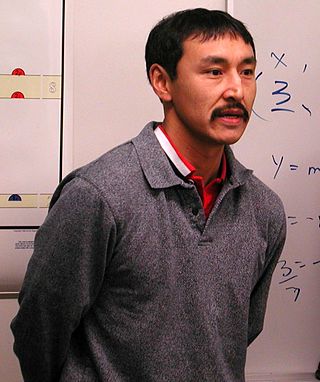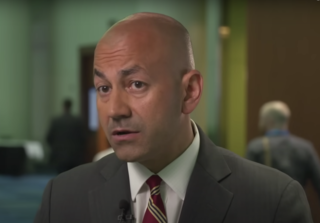
The Northwest Territories is a federal territory of Canada. At a land area of approximately 1,144,000 km2 (442,000 sq mi) and a 2016 census population of 41,790, it is the second-largest and the most populous of the three territories in Northern Canada. Its estimated population as of 2023 is 45,668. Yellowknife is the capital, most populous community, and only city in the territory; its population was 19,569 as of the 2016 census. It became the territorial capital in 1967, following recommendations by the Carrothers Commission.
The Canadian order of precedence is a nominal and symbolic hierarchy of important positions within the governing institutions of Canada. It has no legal standing, but is used to dictate ceremonial protocol.

The premier of British Columbia is the first minister and head of government for the Canadian province of British Columbia. Until the early 1970s, the title prime minister of British Columbia was often used. The word premier is derived from the French word of the same spelling, meaning "first"; and ultimately from the Latin word primarius, meaning "primary".

Paul Okalik is a Canadian politician. He is the first Inuk to have been called to the Nunavut Bar. He was also the first premier of Nunavut.
Consensus government is a form of government by consensus decision-making in Canada used in two of Canada's three federal territories as well as in Nunatsiavut, an autonomous area in the province of Newfoundland and Labrador.
The premier of Nunavut is the first minister for the Canadian territory of Nunavut. The premier is the territory's head of government, although their powers are somewhat more limited than those of a provincial premier.

The premier of Yukon is the first minister and head of government for the Canadian territory of Yukon. The post is the territory's head of government, although its powers are considerably more limited than that of a provincial premier. The office was established in 1978 when most authority was devolved from the appointed commissioner to the leader of the party that had the confidence of the Yukon Legislative Assembly; for the year immediately prior to this, that leader was one of the members serving with the commissioner's Executive Committee.
In Canada, a premier is the head of government of a province or territory. Though the word is merely a synonym for prime minister, it is employed for provincial prime ministers to differentiate them from the prime minister of Canada. There are ten provincial premiers and three territorial premiers. In most provinces and all territories, these persons are styled the Honourable only while in office, unless they are admitted to the King's Privy Council for Canada, in which case they retain the title even after leaving the premiership. In Nova Scotia and Alberta, former premiers are honorary members of the provincial Executive Council and thereby retain the style the Honourable for life.

The commissioner of Yukon is the representative of the Government of Canada in the Canadian federal territory of Yukon. The commissioner is appointed by the federal government and, in contrast to the governor general of Canada or the lieutenant governors of the Canadian provinces, is not a viceroy and therefore not a direct representative of the Canadian monarch in the territory eo ipso.

The commissioner of the Northwest Territories is the Government of Canada's representative in the Northwest Territories. Similar in certain functions to a lieutenant governor, the commissioner swears in the members of the legislative assembly, swears in members of the executive council, assents to bills, opens sessions of the legislative assembly, and signs other government documents such as Orders in Council.

The Northwest Territories Legislative Assembly, or Legislative Council of the Northwest Territories, is the legislature and the seat of government of Northwest Territories in Canada. It is a unicameral elected body that creates and amends law in the Northwest Territories. Permanently located in Yellowknife since 1993, the assembly was founded in 1870 and became active in 1872 with the first appointments from the Government of Canada.
The North-West Territories Liberal-Conservative Party also known formally as the Liberal-Conservative Association prior to 1903 and the Territorial Conservative Association after 1903, was a short lived political party in the Northwest Territories, Canada. from 1897 to 1905. It was a branch of the federal Conservative Party of Canada.
Representation by women has been a significant issue in Canadian politics since 1900.
George Braden was a Canadian politician from the Northwest Territories, Canada. Elected as "Government Leader", Braden would retroactively become the second premier of the Northwest Territories, after a motion was passed in 1994 to change the official title.

The Province of Manitoba, similar to other Canadian provinces and territories, is governed through a Westminster-based parliamentary system. The Manitoba government's authority to conduct provincial affairs is derived from the Constitution of Canada, which divides legislative powers among the federal parliament and the provincial legislatures. Manitoba operates through three branches of government: the executive, the legislative, and the judicial. The executive branch—the Government of Manitoba—consists of the Executive Council and the Premier, who is the head of government and the President of the Executive Council. The legislative branch—the Manitoba Legislature—is composed of the Lieutenant Governor and the Legislative Assembly, which is composed of the 57 members (MLAs) elected to represent the people of Manitoba, as well as the Speaker, the Clerk, the Officers of the Legislative Assembly, and the employees of the legislative service.
The 2011 Northwest Territories general election was held on October 3, 2011. Nineteen members were returned to the 17th Legislative Assembly from single member districts conducted under first-past-the-post voting system.
The Honourable or The Honorable is an honorific style that is used as a prefix before the names or titles of certain people, usually with official governmental or diplomatic positions.









